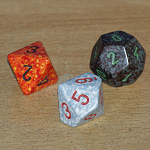This week’s Turn of a Friendly Die Game Wish is about Skill Mismatches
The situation often arises that a player’s real-world skills and the skills of the character she plays don’t quite match up properly. The character might be designed as a “face man”–a conman with a charming face and a ready explanation–but the player isn’t as good at extemporaneous character interaction as her character is. Or the sci/tech geek player might be adept at solving logic puzzles, even when the character is a lumbering cretin with a giant axe.
How do you deal with this mismatch, either as a game master or a player? Do you play it as-played, so that the only character who can seduce the scheming noble’s wife is the only player who can pick somebody up at the bar? Or do you play it as-written, so that the character can bluff the guards into letting him pass, even if the player’s best effort is “I’ve got an urgent message for, uh, Lord Blah-blah-blah”?
This is one of those issues where roleplayers divide into two opposing camps. There’s the school of thought that says that the player’s skills are the character’s skills, that having mechanical rules for social situations ‘steals from roleplaying’, and that a shy tongue-tied player should not be allowed to play a charismatic fast-talking character. I belong to the school of thought that doesn’t accept those arguments.
When I’m GMing, if the character has “Fast Talk” or “Sex Appeal” skill on his or her character sheet, and the player makes the skill roll, the character succeeds. Period. If the player role-plays it well, I might give them a bonus on the roll. I don’t see why a shy player should be prevented from playing a charismatic character any more that a player who’s not a skilled fencer should be prevented from playing a swordsman.
The opposite problem is a bit harder; when the player has skills the character doesn’t. In a way, it’s the same as separating In-Character and Out-of-Character knowledge. I remember playing a ‘lumbering brute’ type called “Vandal” on a chatroom game, and kept having to abandon lines of dialogue I’d written, because they used too far many long words for that type of character.
For logic puzzles and the like, whenever I’ve seen that sort of solution come up players have always dropped out of character to solve the puzzle as players, then drop back into character once they think they’ve solved it. I suppose a GM could ask players to make intelligence checks for their character for every suggestion the player comes up with, but I’ve never seen it played that way.
